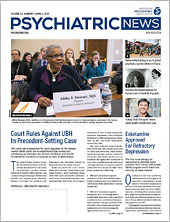More than a dozen states have statutes on the books that impose criminal or civil penalties on women who have opioid use disorder (OUD) during pregnancy. But such statutes may be keeping women in this population from seeking care, suggests a study published in JAMA Network Open. The study found that pregnant women in states that have the statutes have lower rates of OUD diagnosis and treatment.
Fadia Tohme Shaya, Ph.D., M.P.H., a professor and vice chair for academic affairs at the University of Maryland’s Department of Pharmaceutical Health Services Research, and colleagues analyzed data from the private insurance claims of 110,285 women. The patients’ records spanned from June 2007 to June 2015 and indicated that the women had delivered a child and had continuous enrollment in a private insurance plan from nine months before to 12 months after delivery.
In states without the statutes, .18 percent of pregnant women were diagnosed with OUD and .17 percent received treatment. In states with the statutes, .07 percent of pregnant women were diagnosed with OUD, and .12 percent received treatment.
“The striking finding was the lower prevalence of recorded OUD and lower treatment rates in states that have criminal or civil statutes prosecuting [pregnant] women with an OUD diagnosis,” said Shaya, who is also director of the Center on Drugs and Public Policy at the University of Maryland School of Pharmacy. “This might be due to fear of stigma or fear of losing custody of newborns, or fear of losing their jobs or insurance, whereby women do not disclose opioid use. It might also be due to a lower availability of treatment options, which limits access to treatment.”
That treatment was more frequently recorded than diagnosis in states with the statutes suggests that some pregnant women in those states may hesitate to have an OUD diagnosis in their health records or the physicians may be hesitant to code the encounter that way, Shaya added.
“These results call for a drastic change in our approach to OUD, especially during pregnancy,” Shaya said. “The unintended consequences of civil or criminal statutes have to be fully considered, so that they may promote and not stifle the patient-physician relationship. Physicians acting in their patients’ best interest should be able to diagnose and treat OUD without putting patients at risk otherwise.”
In 2016 APA issued a position statement titled “Assuring the Appropriate Care of Pregnant and Newly Delivered Women With Substance Use Disorders.” The statement emphasizes prevention and access to treatment and declares the use of the legal system to address perinatal substance use disorders inappropriate. ■
“Association of Criminal Statutes for Opioid Use Disorder With Prevalence and Treatment Among Pregnant Women With Commercial Insurance in the United States” can be accessed
here. “Assuring the Appropriate Care of Pregnant and Newly Delivered Women With Substance Use Disorders” is available
here.

